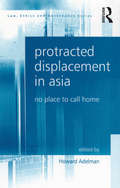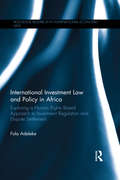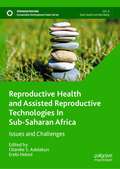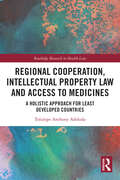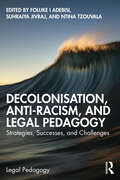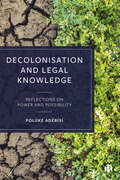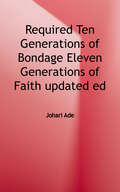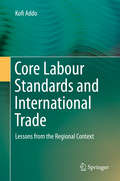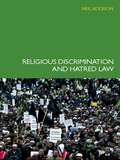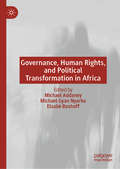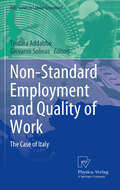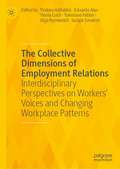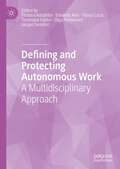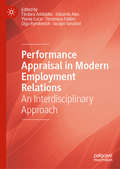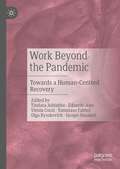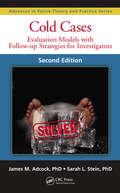- Table View
- List View
Protracted Displacement in Asia: No Place to Call Home (Law, Ethics And Governance Ser.)
by Howard AdelmanIn a protracted displacement situation, refugees are sequestered in camps without right of mobility or employment; their lives remain on hold and stagnate in a state of limbo for a long period. This book reviews the situation and results of research and policies that have left refugees as a forgotten group in protracted situations. The work features case studies by experts who conducted field work examining long-term protracted refugee situations in Nepal, Thailand and Bangladesh, the protracted internally displaced (IDP) situation in Sri Lanka, and the refugee and IDP situation in Afghanistan. Also discussed is an emerging protracted refugee and IDP problem in Iraq. The volume concludes with an analysis of the lessons learned and the applications for policy, and incorporates a valuable bibliography detailing research in this hugely important area. This is a critical resource for academics and policy makers concerned with migration and governance issues.
International Investment Law and Policy in Africa: Exploring a Human Rights Based Approach to Investment Regulation and Dispute Settlement (Routledge Research in International Economic Law)
by Fola AdelekeThis book studies the international investment law regime in Africa and provides a comprehensive analysis of the current treaty practices in Africa from global, regional and domestic perspectives. It develops a public interest regulation theory to highlight the role of investment regulation in sustainable development and the protection of human rights. In doing so, the book identifies seven factors that should be considered by arbitrators in resolving international investment disputes that affect the public interest. It considers how corporations can be held accountable through investment treaties in the absence of a global treaty on business and human rights while protecting the rights of investors and their investments. Furthermore, the book explores the current objectives and features of investor-state dispute settlement (ISDS) as well as the deficiencies and its intersection with the rule of law. It identifies alternatives for ISDS and the extent to which these alternatives address the objectives of attracting investment, depoliticise investment disputes, promote the rule of law and offer remedies to investors. These solutions are offered in relation to the protection of human rights, the promotion of sustainable development and the right of states to introduce domestic public interest regulation. Finally, the book takes a prospective stance and discusses future trends for dispute settlement and investment rulemaking in Africa.
Reproductive Health and Assisted Reproductive Technologies In Sub-Saharan Africa: Issues and Challenges (Sustainable Development Goals Series)
by Olanike S. Adelakun Erebi NdoniThis book focuses on reproductive health rights and assisted reproductive technologies (ART) in sub-Saharan Africa. Each chapter is connected to the other by focusing on different aspects of ART as a means of achieving conception.Topics such as regulation of ART practices, surrogacy and specific aspects of ART, which are gradually becoming acceptable but largely unregulated in Africa, promises to be of interest to scholars, researchers and fertility practitioners. Research in the book take a rights based approach and ethical analysis of ART practice in sub-Saharan Africa by authors from diverse backgrounds bringing together law and society perspectives.Readers stand to gain new knowledge on the societal, legal, medical and psychological requirements, effects and challenges of reproductive health rights and ART in the African context. The book is also relevant to UN Sustainable Development Goal 3: Good Health and Well-being, given that it promotes and advocates for access to reproductive healthcare for persons who have difficulty or are unable to conceive without medical assistance.
Regional Cooperation, Intellectual Property Law and Access to Medicines: A Holistic Approach for Least Developed Countries (Routledge Research in Health Law)
by Tolulope Anthony AdekolaThis book examines the potential for regionalization of intellectual property law and policy as a means of improving pharmaceutical access for least developed countries. The challenge of sustainable access to pharmaceuticals continues to be an issue of global significance. While much has been written on emerging economies in this context, least developed countries have been largely overlooked. This book fills this gap by taking the East African Community as a case study of developing and least developed countries to illustrate why and how a regional collective approach is preferred. It adopts a holistic approach in finding sustainable solutions to both IP and non-IP barriers to pharmaceutical access across a range of inter-related issues through a regional cooperative scheme. It evaluates factors that are necessary for successful regional cooperation, such as legal and policy coherence, WTO rule compliance, the threat of protectionism, regional competition rules, and so on, in order to produce relevant legal and policy recommendations to both existing and intending regional coalitions desiring to improve pharmaceutical access. It also looks beyond the scope of IP barriers to pharmaceutical access, examining non-IP-related factors such as pharmaceutical market intelligence, local pharmaceutical manufacturing capacity, economies of scale and purchasing power, medical regulation and quality assurance, technology transfer, and market size amongst others. The book will be an invaluable resource for academics, researchers and policy-makers working in the areas of Public Health Law, International Trade Law, Intellectual Property Law and Development Studies.
Decolonisation, Anti-Racism, and Legal Pedagogy: Strategies, Successes, and Challenges (Legal Pedagogy)
by Foluke I Adebisi Suhraiya Jivraj Ntina TzouvalaThis book offers an international breadth of historical and theoretical insights into recent efforts to "decolonise" legal education across the world. With a specific focus on post- and decolonial thought and anti-racist methods in pedagogy, this edited collection provides an accessible illustration of pedagogical innovation in teaching and learning law. Chapters cover civil and common law legal systems, incorporate cases from non-state Indigenous legal systems, and critically examine key topics such as decolonisation and anti-racism in criminology, colonialism and the British Empire, and court process and Indigenous justice. The book demonstrates how teaching can be modified and adapted to address long-standing injustice in the curriculum. Offering a systematic collection of theoretical and practical examples of anti-racist and decolonial legal pedagogy, this volume will appeal to curriculum designers and law educators as well as to undergraduate and post-graduate law level teachers and researchers.
Decolonisation and Legal Knowledge: Reflections on Power and Possibility
by Folúkẹ́ AdébísíThe law is heavily implicated in creating, maintaining, and reproducing racialised hierarchies which bring about and preserve acute global disparities and injustices. This essential book provides an examination of the meanings of decolonisation and explores how this examination can inform teaching, researching, and practising of law. It explores the ways in which the foundations of law are entangled in colonial thought and in its [re]production of ideas of commodification of bodies and space-time. Thus, it is an exploration of the ways in which we can use theories and praxes of decolonisation to produce legal knowledge for flourishing futures.
Ten Generations of Bondage Eleven Generations of Faith: The Lewis and Green Family History
by Johari AdeTen Generations of Bondage is the true story about an African American family from enslavement to the 21st century. <p><p>The Lewis-Green historical account begins in 1740 when a freeborn Violet sues her employer for unjustly keeping her in bondage. It continues to the year 2012 in the midst of the re-election campaign of Barack Obama, the first African American President. Although the family somehow manages to keep the faith throughout the years, this book takes the reader through unimaginable atrocities that the family must face over the next generations as they journey to the new millennium. <p><p>The author proves that fact is stranger than fiction as the reader learns the story of Syntha, who was sold at least six times; Kitty, a proud African kidnapped from her homeland and arriving in America in chains; and Tom, a Native American who was enslaved while attempting to rescue his wife from it. Even after "freedom" the family must face lynching, murder and many other challenges as they desperately attempt to reconnect their fragmented families. <p><p>Ten Generations of Bondage keeps the reader engaged as the family navigates through the horrors of slavery, the challenges of emancipation, the degradation of Jim Crow, achievements of the civil rights movements, and the demoralization of modern day racism. Despite the degree or the type of bondage, the Lewis-Green family always manages to keep the faith. <p><p>This is a must-read for genealogists, family historians, and anyone wishing to explore the richness of the African American Family.
Core Labour Standards and International Trade: Lessons from the Regional Context
by Kofi AddoThis book examines the labour standards provisions in a number of Regional and Bilateral Trade Agreements, and assesses the potential of using the relevant clauses in these trade agreements as a benchmark for a multilateral approach. Based on the lessons learned from the Regional model, the book proposes a Global Labour and Trade Framework Agreement (GLTFA) combined with a joint ILO/WTO enforcement mechanism to resolve the contentious issue of the link between the CLS and international trade. The history of the linkage between the Core Labour Standards (CLS) and international trade dates back roughly 150 years, and has recently become one of the most vexing issues facing policy-makers. At the heart of the debate is the question whether or not trade sanctions should be imposed on countries that do not respect the CLS as embodied in multilateral conventions administered by the International Labour Organization (ILO). Concretely, this would entail inserting a social clause in the World Trade Organization (WTO) rules, and would trigger the imposition of sanctions on those countries that do not adhere to the CLS.
Religious Discrimination and Hatred Law
by Neil AddisonDealing with this new and controversial area, this is the first comprehensive guide to religious discrimination and hatred legislation. Written by a practising barrister, experienced in all courts and tribunals, this book uses many practical examples covering all forms of religious belief. Exploring part two of the Equality Act and the Racial and Religious Hatred Act, Addison examines the fundamental differences between religion and race which make the operation of these new laws far more problematic than other racial laws. By looking at these new pieces of legislation, together with the existing Human Rights provisions of Article 9 of the European Convention on Human Rights, the 2003 Employment Discrimination Regulations and the 2001 Religiously Aggravated Offences, he is able to draw subtle comparisons and create a holistic overview of religion and the law. Challenging some common but simplistic views on the nature of religion and its accommodation in the law, this book is an essential read for students and professionals interested in human rights law and law and religion.
Governance, Human Rights, and Political Transformation in Africa
by Michael Addaney Michael Gyan Nyarko Elsabé BoshoffThis edited volume examines the development and challenges of governance, democracy, and human rights in Africa. It analyzes the emerging challenges for strengthening good governance in the region and explores issues related to civil, political, economic, cultural, and social rights highlighting group rights including women, girls, and other minority groups. The project presents a useful study of the democratization processes and normative developments in Africa exploring challenges in the form of corruption, conflict, political violence, and their subsequent impact on populations. The contributors appraise the implementation gap between law and practice and the need for institutional reform to build strong and robust mechanisms at the domestic, regional, and international levels.
Non-Standard Employment and Quality of Work
by Tindara Addabbo Giovanni SolinasThe international literature on non-standard employment has mostly focussed on its impact on employment, and more recently on working and living conditions. This volume explores these issues with special reference to Italy. Italy is characterized by very low participation rates (particularly women's), a high degree of fragmentation of labour contracts and a very intense non-standard work diffusion that make this context a particularly interesting case for analysis. New elements of discussion are provided with reference to the interaction of non-standard work, employment probability and living conditions. Interesting insights on the impact of non-standard work on the transition to stable employment and workers' careers emerge, suggesting a possible failure of companies' internal systems of work evaluation. The effects on labour productivity and on companies' performance are analysed. Within this framework, a new perspective on quality of work is suggested.
The Collective Dimensions of Employment Relations: Interdisciplinary Perspectives on Workers’ Voices and Changing Workplace Patterns
by Tindara Addabbo Edoardo Ales Ylenia Curzi Tommaso Fabbri Olga Rymkevich Iacopo SenatoriThis edited volume explores the old and new “collective dimensions” of employment relations. It examines specific challenges stemming from new forms of work of the digital and sharing economy, such as measurement, monitoring, assessment, and remuneration of work, the protection of work-life balance, the impact of new technologies on health and safety, the adaptation of occupational skills to new work processes, and the responses to the digital restructuring of undertakings. It addresses a series of questions such as how the representational action of unions and works councils can adapt to the challenges posed by new production systems and whether the legislative framework needs to be reformed to ensure that digital workers enjoy the right to collective representation. This important collection offers readers a renewed theoretical perspective and justification of the role that the dialogue between workers (representatives) and companies could play in an increasingly complex world of work.
Defining and Protecting Autonomous Work: A Multidisciplinary Approach
by Tindara Addabbo Edoardo Ales Ylenia Curzi Tommaso Fabbri Olga Rymkevich Iacopo SenatoriThis book, adopting a multidisciplinary approach, investigates the definition of autonomous work and the kind of protection it receives and should receive in a global perspective. The book advocates for the existence of genuine autonomous work to be distinguished from employment and false self-employment. It deserves specific attention from legislators in the view of removing any obstacles to the exercise of freedom of association and collective action at large. The book is divided into two parts. The first focuses on the evolving notion of autonomy and its consequences on social protection, offering a theoretical frame from an organizational, political and legal point of view. The second aims at discovering new regulatory and protective horizons for autonomous work, in the light of blockchain, platform work, EU Competition Law, social security and liberal professions. Finally, the authors offer insights and recommendations on how to protect work beyond categories.
Performance Appraisal in Modern Employment Relations: An Interdisciplinary Approach
by Tindara Addabbo Edoardo Ales Ylenia Curzi Tommaso Fabbri Olga Rymkevich Iacopo SenatoriContributing to the debate on work performance evaluation in a time of technological transformation, this book explores the impact of digitisation on production and organisation models, as well as on the rights and interests of the stakeholders involved. As organisations down-size, merge with other companies and become decentralised, the boundaries in employer-employee-customer relationships are blurred and new models for the organisation and assessment of work performance have emerged. With these new models, innovative regulatory approaches are sorely needed. Taking an interdisciplinary approach and drawing on theoretical concepts from organisation studies, human resource management, sociology and labour economics, this all-encompassing collection is not only essential reading for academics and students, but also for policy-makers and employers who are looking for innovative and practical solutions to the challenges of modern employment relations.
Work Beyond the Pandemic: Towards a Human-Centred Recovery
by Tindara Addabbo Edoardo Ales Ylenia Curzi Tommaso Fabbri Olga Rymkevich Iacopo SenatoriThis book addresses the impact of Covid-19 on employment relations and provides a reconstruction and a critical assessment of the measures enacted worldwide to tackle the economic and social crisis triggered by the global health emergency. The pandemic has been a booster of critical issues that for years have been silently shaping society and the labor market and so it can represent an opportunity to relaunch a critical analysis on the future of work.Beginning from this assumption, this book collects contributions from different disciplines, including law, economics and organization theory. It covers topics such as the measures enacted to protect workers’ health and cushion the labour, the new inequalities that emerged during the pandemic and the strategies to construct a sustainable and human-centred development in the post pandemic scenario. It is highly relevant to scholars and students of organisation studies, resilience, the labour market and labour law.
Cold Cases: Evaluation Models with Follow-up Strategies for Investigators (Advances In Police Theory and Practice Series)
by James M. Adcock Sarah L. SteinBecause the investigation of cold cases is usually an arduous and time-consuming task, most law enforcement agencies in the United States are not able to dedicate the resources necessary to support the cold case investigation process. However, when those cases are fully pursued and prosecuted, they often result in convictions and lengthy prison terms. <p><p>Cold Cases: Evaluation Models with Follow-up Strategies for Investigators, Second Edition saves law enforcement time by providing detailed guidelines for determining if a cold case is solvable, and if so, how to organize, manage, and evaluate the investigation. It also provides techniques for developing investigative strategies to complement the evaluation process and resolve the crime. <p><p>This second edition features a new revised model and methodology for investigating cold cases suitable for all police and public safety agencies--large or small, domestic or international. This new model is more expeditious and convenient for departments that have less manpower and experience in dealing with cold cases. It emphasizes the prioritization of cold cases based on the availability of physical evidence and the chances of deriving matches from said evidence and an identified person of interest. <p><p>Additional topics covered in the second edition include: - How cases go cold - Strategies for creating a cold case unit - Cold Case investigations in a Dutch educational environment--a chapter written by members of the Dutch Police Academy - New forensic Science technologies, including DNA, CODIS, and AFIS - Case studies demonstrating advances in suspectology - Strategies for effective investigative interviewing - Challenges posed by staged crime scenes in cold cases - How to craft a cold case evaluation report <p>The expert authors of this book maintain The Center for the Resolution of Unresolved Crimes
Cold Cases: Evaluation Models with Follow-up Strategies for Investigators, Second Edition (Advances in Police Theory and Practice)
by James M. Adcock Sarah L. SteinBecause the investigation of cold cases is usually an arduous and time-consuming task, most law enforcement agencies in the United States are not able to dedicate the resources necessary to support the cold case investigation process. However, when those cases are fully pursued and prosecuted, they often result in convictions and lengthy prison terms. Cold Cases: Evaluation Models with Follow-up Strategies for Investigators, Second Edition saves law enforcement time by providing detailed guidelines for determining if a cold case is solvable, and if so, how to organize, manage, and evaluate the investigation. It also provides techniques for developing investigative strategies to complement the evaluation process and resolve the crime.This second edition features a new revised model and methodology for investigating cold cases suitable for all police and public safety agencies—large or small, domestic or international. This new model is more expeditious and convenient for departments that have less manpower and experience in dealing with cold cases. It emphasizes the prioritization of cold cases based on the availability of physical evidence and the chances of deriving matches from said evidence and an identified person of interest.Additional topics covered in the second edition include: How cases go cold Strategies for creating a cold case unit Cold case investigations in a Dutch educational environment—a chapter written by members of the Dutch Police Academy New forensic science technologies, including DNA, CODIS, and AFIS Case studies demonstrating advances in suspectology Strategies for effective investigative interviewing Challenges posed by staged crime scenes in cold cases How to craft a cold case evaluation report The expert authors of this book maintain The Center for the Resolution of Unresolved Crimes and conduct training and consulting worldwide. Their practical book is designed to help law enforcement agencies resurrect long-forgotten cases, bringing closure to victims and holding accountable those who are responsible. This book is part of the Advances in Police Theory and Practice series
Law For Business And Personal Use
by John Adamson Amanda MorrisonExplore the foundations of business law as well as the application of legal concepts to everyday life. LAW FOR BUSINESS AND PERSONAL USE, 19E, combines strong content and interactive technology with consistent, proven instruction to maintain student interest and support active learning. Coverage includes contracts, criminal law, environmental law, family law, and consumer protection. With more than 1,000 cases, LAW FOR BUSINESS AND PERSONAL USE, 19E, offers plenty of opportunities for case analysis and research.
Law for Business and Personal Use
by John E. Adamson Amanda MorrisonLAW FOR BUSINES AND PERSONAL USE, 19E provides instruction on the foundations of business law as well as the application of legal concepts to everyday life.
Law for Business and Personal Use
by John E. Adamson Norbert J. MietusThis 15th edition of Law for Business and Personal Use maintains a fundamental emphasis on business law, while introducing personal law topics that interest students. Give your students the most comprehensive coverage of contracts, ethics, employment law, credit, banking, partnerships, bankruptcy, etc.
Law for Business
by John E. Adamson Edward J. Conry Norbert J. MietusThis text effectively teaches an understanding of legal obligations and rights in business, and how to avoid legal difficulties. Law For Business effectively covers areas such as computer law, financial crimes, legal careers, environmental law, international law, and more.
Law for Business and Personal Use
by John E. AdamsonAdamson (business, Southwest Missouri State University) outlines the U. S. legal system and explains how various laws apply to the rights and duties of small businesses. The 32 chapters discuss civil procedure, contract law, leasing of real property, wills and trusts, employment law, legal forms of business organization, and financial transactions. Annotation ©2006 Book News, Inc. , Portland, OR (booknews. com)
Law for Business and Personal Use
by John E. AdamsonAdamson (business, Southwest Missouri State University) outlines the U. S. legal system and explains how various laws apply to the rights and duties of small businesses. The 32 chapters discuss civil procedure, contract law, leasing of real property, wills and trusts, employment law, legal forms of business organization, and financial transactions. Annotation ©2006 Book News, Inc. , Portland, OR (booknews. com)
Law for Business and Personal Use (16th edition)
by John E. AdamsonAdamson (business, Southwest Missouri State University) outlines the U. S. legal system and explains how various laws apply to the rights and duties of small businesses. The 32 chapters discuss civil procedure, contract law, leasing of real property, wills and trusts, employment law, legal forms of business organization, and financial transactions.
